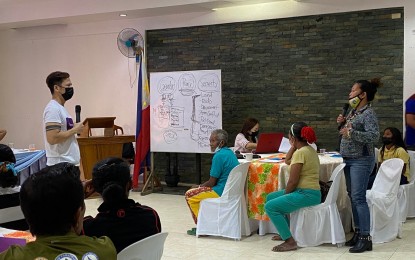
UPHOLD IP RIGHTS. The OPAPRU and NCIP hold a three-day assembly for Indigenous Peoples (IPs) in Agusan del Sur on March 22-24, 2022. The assembly aims to empower IP women who are exposed to armed conflict and discrimination. (Photo courtesy of OPAPRU)
MANILA – The government will keep the Indigenous Peoples (IPs) as an important part of society, the Office of the Presidential Adviser on Peace, Reconciliation and Unity (OPAPRU) said on Wednesday.
In a social media post, the OPAPRU said it is committed to surfacing and addressing issues concerning the IP community.
It recently partnered with the National Commission on Indigenous Peoples (NCIP) for a three-day IP Women’s Assembly in Agusan del Sur.
The activity was part of the month-long observance of the National Women’s Month with the theme “We Make Change Work for Women: Agenda ng Kababaihan Tungo sa Kaunlaran (Women Toward Progress)” which served as a springboard for the establishment of an Indigenous Peoples Organization (IPO).
The assembly, spearheaded by the OPAPRU’s Social Healing and Peace Building Department (SHAPED) and the NCIP, has become one of the government’s many venues to talk about the situation of IP women who are exposed to armed conflict and discrimination.
It has also promoted the IPs’ rights to basic social services and developed gender-related programs and projects that seek to protect women’s rights.
OPAPRU-SHAPE Director Vanessa Pallarco said they will continue to discuss matters recognizing underlying factors affecting IPs, especially women, and help them become more productive “so that they can partake in the nation-building.”
“The SHAPE Program will continue to undertake these interventions that will address the needs of our women IPs, empower them, and at the same time, help transform their areas into peaceful, progressive, and resilient communities,” Pallarco said.
The NCIP and OPAPRU have been working hard to provide "solid" protection for IPs against discrimination.
The OPAPRU said more activities that will empower IP communities will be conducted for other indigenous tribes nationwide.
On top of this, Republic Act 8371, also known as the “Indigenous Peoples Rights Act” (IPRA), recognizes the rights of IPs to manage their ancestral domains and it is the primary law of the current national policy for IPs.
Based on the report of the United Nations Development Program (UNDP) in July 2013, an estimated 14 to 17 million IPs belonging to 110 ethnolinguistic groups are residing in the Philippines.
About 33 percent of them can be found in Cordillera Administrative Region and 61 percent are in Mindanao while the rest are in the Visayas region. (PNA)
